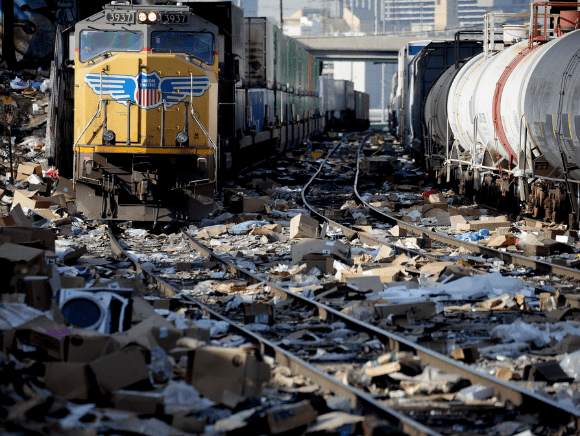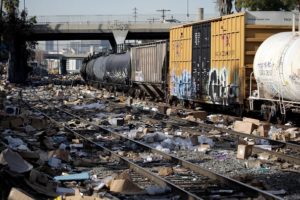California, famous for its lovely weather, women, and wonderous coastline is also well known for its movies. In that respect, one wonders if life is imitating art in the Golden State these days. Remember The Great Train Robbery? It was both a movie and a real-life event – but they are, shall we say, not so great when they are happening on a scale this massive.
According to Union Pacific Railroad authorities a massive uptick in train robberies is taking place. They suspect the increase in train theft is due to the seemingly endless pandemic, along with the Los Angeles County District Attorney’s policy of no-cash bail arrests. As Lupe Valdez, Senior Public Affairs Director of the train company, explains, “We are making arrests, but what our officers are seeing on the ground is that people are basically being arrested, there is no bail, they come out the next day and come back to rob our trains.”
 Union Pacific has their own private police force, and officers report that detained thieves simply say, when confronted, that they will be back the next day. Valdez claims 90 shipping containers are compromised every day. In one year alone, from October 2020 to October 2021, train robberies have risen 356%. And the thieves are a picky bunch: opting for easily pawned items like jewelry and electronics while abandoned appliances, medical supplies, and children’s artworks destined for family members far away are left littering the tracks.
Union Pacific has their own private police force, and officers report that detained thieves simply say, when confronted, that they will be back the next day. Valdez claims 90 shipping containers are compromised every day. In one year alone, from October 2020 to October 2021, train robberies have risen 356%. And the thieves are a picky bunch: opting for easily pawned items like jewelry and electronics while abandoned appliances, medical supplies, and children’s artworks destined for family members far away are left littering the tracks.
This week, Union Pacific’s chief is meeting with the Los Angeles Police Department to express frustrations. Last month, a letter from the company was sent to Los Angeles County District Attorney George Gascón, urging the elected official to deal with the “spiraling crisis” and begging for criminals to be held accountable. Will Los Angeles respond to requests for help from Union Pacific? They do love their no cash bail policy.
Criminals Are Flourishing
Alex Bastian, Special Advisor to Gascón, was on it – and provided a written statement to a local news outlet. It reads in part:
“Some cases presented to our office by Union Pacific have been filed, such as burglary and grand theft, while others have been declined due to insufficient evidence. We make charging decisions based on the evidence. Our office takes Union Pacific’s concerns seriously and hopes to discuss this issue more in the coming weeks.”
Residents have reported seeing dozens of people on the tracks every night carrying backpacks and duffle bags for use after the container locks are jimmied open. A typical hardware store bolt-cutter can easily access shipping containers. And the thieves use a simple strategy for train smash and grabs. Stopped trains are the easiest targets, although a slow-moving one can be robbed with a bit of know-how; a burglar can access the cars and pull a handbrake. Sensors detect the brake and automatically decrease or stop the train. By the time the engineer checks things out, the robbery is over, and within hours stolen goods are on eBay and Facebook Marketplace.
It’s A Good Deal, Right?
Like all crimes, train robberies come at a cost: Union Pacific reports that replacement and clean-up have dinged their business $5 million in damages, losses, and claims. But those numbers eventually impact the consumer as prices will rise to make up for the increase in overhead for Amazon, REI, and other businesses.
Roughly 40% of goods shipped to the U.S. come through Los Angeles and Long Beach ports. It’s a buffet of unsecured TVs, laptops, COVID-19 tests, and anything you might desire – if you have 20 or 30 minutes to sort through thousands of containers with a discerning eye for resale.
Jessica Kahanek, a spokeswoman for the Association of American Railroads in Washington, says the “Railroads and their police forces are taking action to combat the criminal activity including increasing their presence where thefts have been a persistent challenge, particularly in the Los Angeles area.”
But if it becomes the businessperson’s job to ensure public safety, and there are little to no consequences for criminals, where are we headed as a nation?
~ Read more from Sarah Cowgill.





